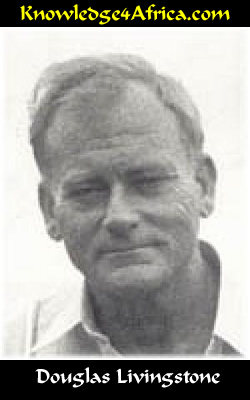|
READ THIS
This is a descriptive nature poem, and not particularly complicated in any way. The poet is painting a
picture with words of a stork standing on its long thin legs in the shallow waters of an African lake at dawn.
The stork appears to look both tired and sad: tired possibly because of its long flight to this spot; sad
because it is all alone, its companion storks not yet having arrived.
 A NOTE ON THE POET
A NOTE ON THE POET
Douglas Livingstone was born in Kuala Lumpur, Malaysia, in 1932. He came to South Africa with his
family at ten years of age when his father was captured by the Japanese. He would settle in Natal where
he went to Kearsney College.
He attended university in what was then Salisbury, Rhodesia -- now Harare, Zimbabwe -- where he
trained as a bacteriologist, eventually becoming a marine biologist. He was later awarded a Ph.D. in
Science from the University of Natal.
Livingstone was employed as a marine biologist at the Council for Scientific and Industrial Research in
Durban.
He produced several volumes of poetry and wrote radio plays -- winning several awards, the highest
being an Honorary Doctorate from the University of Natal.
He died in Durban in 1996.
Have you looked at the questions
in the right column?
|
TEST YOURSELF!
Read the left column and then answer
the following questions:
"neck flattened, ruminative,
beak on chest, contemplative eye
filmy with star vistas and hollow
black migratory leagues, strangely,
ponderously alone and some weeks
early."
- What is the significance of using the word "ponderously" in "ponderously
alone"? (4)

[Need help?]
The poet is attempting to put across two ideas here.
First, the stork is alone. It has arrived some weeks too early and the rest of its flock is not yet here.
Second, the stork is a big bird and clumsy in its movement. It is therefore ponderous.
The word "ponderous" also carries the idea of "pondering". The stork is deep in thought --
even somewhat sad and lonely.
|
- What words would one use to describe birds which live together in groups? (1)

[Need help?]
"He sighed.
Stretching his wings he clubbed
the air; slowly, regally, so very tired,
aiming his beak he carefully climbed
inclining to his invisible tunnel of sky,
his feet trailing a long, long time."
- The poet paints an air of sadness here. Why would the stork be sad? (4)

[Need help?]
Be aware, of course, that the stork is not sad. That is a case of personification, of the poet transferring
his own thoughts onto the stork.
Possibly the sadness is linked to the stork's loneliness. The lake at dawn is a lonely place and the stork
has arrived several weeks early. The rest of the flock has not yet arrived.
|
- What other words in this poem reinforces this image of sadness? (2)

[Need help?]
You might mention words like "tired", "ponderous" and "hollow".
|
- What words tell us that the stork does not appear to appreciate the arrival of the
dawn? (4)

[Need help?]
The poet says that the dawn "struck" -- a violent word which indicates pain or anger.
Everything, the poet says, was "blood and gold". True, the poet is referring to the colour of the sky
which was reflected in the water. But "blood" too is a harsh word, conveying pain and anger.
Finally, the poet comments that the stork "sighed", as if it was not happy at the arrival of the dawn.
|
- Why would the stork "club" the air? (4)

[Need help?]
The stork is a large and ungainly bird. It cannot fly easily, at least not until it has attained speed and
altitude. Its wings therefore have to beat the air with great force to initiate lift off. It beats the air; it clubs
the air.
|
- Why would the stork's feet be "trailing a long, long time"? (4)

[Need help?]
We are once more faced with the stork's clumsiness in getting into the air.
Unlike little birds which quickly tuck in their legs to become streamlined, the stork's legs remain trailing
down like an aeroplane's wheels, just in case it needs to land again. Only once it has gained altitude, do
its legs fold up into a streamlined position.
|
The term "personification" means the giving of human characteristics to animals or to inanimate
objects.
- How many examples of personification can you find? (4)

[Need help?]
The stork is "too tired" to rearrange its plumage. It is "ruminative" and appears to be lonely.
It aims its beak. It has a "contemplative eye". It sighs and clubs the air.
|
|



